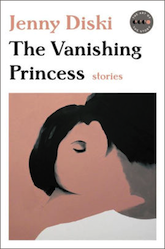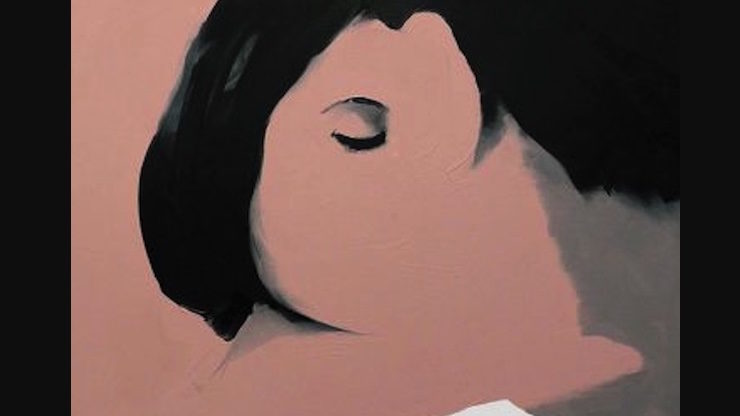Before her death from lung cancer in 2016, Jenny Diski was perhaps best known as an essayist and travel writer, with a gift for combining travel writing with memoir, as in her 1997 work, Skating to Antarctica. She was also known, in certain circles, as “that writer Doris Lessing rescued.” That had the benefit of being true: after a painful childhood, including alleged sexual abuse and multiple stays in mental health institutions, Diski found herself in the home of Doris Lessing, probably best known to Tor.com readers as one of the few (I think perhaps the only) writer honored with both a Guest of Honor spot at Worldcon and the Nobel Prize for Literature.
A few years later, Diski started working in journalism. Eventually, she churned out acclaimed non-fiction, ten novels and one short story collection, The Vanishing Princess. Originally published in the United Kingdom in 1995, and now available in the United States from Harper Collins, the collection follows Lessing’s habit of bridging the boundaries between genre and mainstream literature—and proves that, among other things, Diski could also write fairy tales.
Buy the Book


The Vanishing Princess: Stories (Art of the Story)
Most of the stories in the collection are not fairy tales, or even speculative, however, whatever a title like The Vanishing Princess might imply. (I mention, since I was expecting a more speculative element.) “Leaper,” for instance, one of the strongest tales in the collection, which starts out as the tale of a writer suffering from severe impostor syndrome, is grounded in the reality of trains and gyms. “My Brother Stanley” reads more as memoir than story, and is also rooted firmly in the real, a world of photo albums and bombs and parents who cannot stop fighting. “Bath Time,” more or less the story of a woman’s life, told through her different bathrooms, is filled with exciting period details about heating bath water in cheap flats in the 1950s and shooting up heroin in bathtubs. (It has a much happier ending than you might expect after all this.)
On a similar note, “Wide Blue Yonder” is a poignant study of a woman who makes certain realizations about her marriage, and her life, while on vacation in the Caribbean, that earns bonus points for its evocative and generally accurate descriptions of coral reefs, even if Diski’s character doesn’t—or can’t—identify most of the species there. “Short Circuit,” seemingly drawn directly from some of Diski’s personal experiences, feels even more grounded in reality. Its protagonist’s fears are not realistic, but the story’s descriptions of panic disorders and paranoia and how they can define and destroy relationships are. “Sex and Drugs and Rock and Roll II” tells of a mother and daughter who get, perhaps, a bit too realistic about sex and drugs, if not rock and roll.
A few stories do ponder the edges of reality. “Strictempo” explores mental institutions, and why a young girl might find herself in one, and find it safer and more comforting than the outside world. “On the Existence of Mount Rushmore” is less a story and more an exploration of what knowledge and information we really need—which turns into a mediation about existence, and specifically, the existence and reality of Mount Rushmore. (The story spends a long moment seriously considering that Mount Rushmore might be nothing more than a backdrop created by Alfred Hitchcock, which is a great thought, and one that could start a fantasy or alternative reality story, but doesn’t.) “Housewife” plays with Greek myths of creation and the labyrinth, but is essentially a triumphant tale of a suburban affair, with a bit of kinkiness and scarves thrown in.
But the remaining three stories are pure fairy tale, if highly self-aware fairy tales: “The Old Princess,” for instance, pauses to explain that its eponymous protagonist has never read “Puss-in-Boots,” and therefore does not know that cats, too, can have destinies, just like princesses, and the protagonist of “Shit and Gold”—yes, as you might guess from the title, about Rumpelstiltskin—knows full well that she’s in a fairy tale, and which fairy tale, using that to her advantage. Two of these fairy tales, “The Vanishing Princess” and “The Old Princess,” bookend the collection. “Shit and Gold” appears a little after the middle.
Of these, the first, “The Vanishing Princess,” is probably the strongest. An original fairy tale, it tells of a princess kept in a tower—perhaps as a prisoner, but perhaps not; as the tale notes, she has never tried to leave. So she might be a prisoner, or might not be. Unused to food, she has no need to eat, and spends her days quietly reading—that is, until she is found by one soldier, and then a second and finds herself caught in a conversation that is about her, in a way, and not about her at all, in another way. It is an examination of fairy tales, of expectations, of the male gaze—and the way conversations can often obscure the subject under discussion. It’s the most overtly magical of the three stories, without the touches of realism and sex that touch the other two tales, perhaps why it appealed to me the most.
The weakest is, unfortunately, the last tale, “The Old Princess.” It appears at the end of this collection, I assume, as a sort of coda to “The Vanishing Princess,” since it’s another tale of a princess left in a tower, although this one does not vanish, is fully able to eat, and has a cat. This is all very nice, although the tale’s almost arch point of mentioning menstruation, partly as a callback to Sleeping Beauty and her pricked finger, but told in a “see, I have thought about the practical points of getting locked into a tower” manner, ended up making me realize that although the tale had discussed menstrual pads, it had not exactly explained the rest of the sanitation issues, which completely threw me out of the tale and out of fairy tale modes whatsoever. (For the record, yes, these sorts of issues have been mentioned by other fairy tale authors.) More to the point, the story is unusual in the collection in not really having an ending, though the ambiguous ending of “Wild Blue Yonder” is close, and thus, is the only unsatisfactory story in the group—an odd choice to end the collection with.
“Shit and Gold” certainly has the most memorable title. A play on the Rumpelstiltskin tale, it features a miller’s daughter well aware that she is in a fairy tale—an awareness that she uses to her advantage, to handle Rumpelstiltskin in a rather nontraditional fairy tale manner. It’s arguably the most fun story in the entire collection—certainly the tale with the most unambiguously happy ending—and perhaps that’s why I find myself unable to completely buy it. On the other hand, this contains some of the sharpest, wittiest writing in the collection. I suspect it will be a reader favorite.
All that said, I find myself inclined to recommend this collection more to lovers of literary short stories than to lovers of fairy tales—much though the two groups can overlap. These stories originally appeared in places like New Statesman and The London Review of Books instead of The Magazine of Fantasy and Science Fiction or Asimov’s for a reason. I should also warn readers that these stories do not hesitate to tackle the difficult subjects of suicide, abortion, infidelity, drug use and mental illness. That said, all—even the “The Old Princess”—are beautifully written, and some—particularly “Leaper” and “Bath Time”—are great stories in their own right, exploring issues of love and sexuality, often on a slant. And I think many writers will recognize themselves in bits of “Leaper” and “Short Circuit.” It’s a short collection, from a brilliant stylist, well worth a look.
Mari Ness lives in central Florida.










